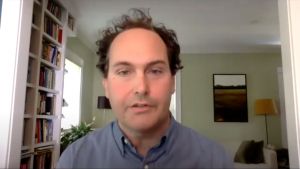Idealist Lessons on American Leadership
About this Event
Globalization is being challenged by nationalists, undercut by trade wars, and battered by the pandemic, while "America First" appeals to the nation’s isolationist impulses. But with economic volatility, inequality, and a warming planet—can the United States afford to step away from the global stage? In 1942, at another moment of global turmoil, Republican presidential candidate Wendell Willkie published a bestselling book explaining a new vision of a small and interconnected world. Brown University historian Samuel Zipp joins the Council to describe the lessons Willkie learned about American engagement in the world during his travels around the globe and the parallels he sees between 1942 and today.
Copies of Samuel Zipp’s latest book, The Idealist: Wendell Willkie's Wartime Quest to Build One World, are available for purchase through our local book partner, The Book Cellar.
